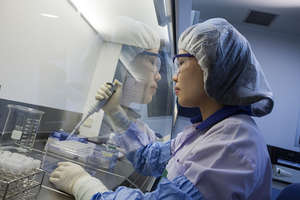Horizon 2020 - Sanita', cosa finanzia il work programme 2016-2017

Ammonta ad oltre 933 milioni di euro il budget provvisorio del programma di lavoro 2016-2017 della sfida sociale 1 di Horizon 2020
La Commissione Ue ha pubblicato il programma di lavoro provvisorio relativo alla prima sfida sociale di Horizon 2020, Health, demographic change and wellbeing, il cui obiettivo è promuovere una migliore qualità della vita per i cittadini europei.
Il programma di lavoro 2016-2017, che sarà approvato entro metà ottobre, si concentra su due temi specifici:
- invecchiamento sano,
- assistenza sanitaria personalizzata,
che saranno declinati in sotto-temi nell’ambito di 3 inviti a presentare proposte:
1. Call - Personalised Medicine
1.1 Understanding health, well-being and disease
- SC1-PM-01-2016: Multi omics for personalised therapies addressing diseases of the immune system
- SC1-PM-02-2017: New concepts in patient stratification
- SC1-PM-03–2017: Diagnostic characterisation of rare diseases
- SC1-PM-04–2016: Networking and optimising the use of population and patient cohorts at EU level
1.2. Preventing disease
- SC1-PM-05–2016: The European Human Biomonitoring Initiative
- SC1-PM-06–2016: Vaccine development for malaria and/or neglected infectious diseases
- SC1-PM-07–2017: Promoting mental health and well-being in the young
1.3 Treating and managing diseases
- SC1-PM-08–2017: New therapies for rare diseases
- SC1-PM-09–2016: New therapies for chronic diseases
- SC1-PM-10–2017: Comparing the effectiveness of existing healthcare interventions in the adult population
- SC1-PM-11–2016-2017: Clinical research on regenerative medicine
1.4 Active ageing and self-management of health
- SC1-PM-12–2016: PCP - eHealth innovation in empowering the patient
- SC1-PM-13–2016: PPI for deployment and scaling up of ICT solutions for active and healthy ageing
- SC1-PM-14–2016: EU-Japan cooperation on Novel ICT Robotics based solutions for active and healthy ageing at home or in care facilities
- SC1-PM-15-2017: Personalised coaching for well-being and care of people as they age
1.5 Methods and data
- SC1-PM-16–2017: In-silico trials for developing and assessing biomedical products
- SC1-PM-17–2017: Personalised computer models and in-silico systems for well-being SC1-PM-18–2016: Big Data supporting Public Health policies
- SC1-PM-19–2017: PPI for uptake of standards for the exchange of digitalised healthcare records SC1-PM-20-2017: Development of new methods and measures for improved economic evaluation and efficiency measures in the health sector
1.6 Health care provision and integrated care
- SC1-PM-21-2016: Implementation research for scaling-up of evidence based innovations and good practice in Europe and low- and middle-income countries
Coordination activities
- SC1-HCO-01-2016: Valorisation of FP7 Health and H2020 SC1 research results
- SC1-HCO-02-2016: Standardisation of pre-analytical and analytical procedures for in vitro diagnostics in personalised medicine
- SC1-HCO-03–2017: Implementing the Strategic Research Agenda on Personalised Medicine SC1-HCO-04–2016: Towards globalisation of the Joint Programming Initiative on Antimicrobial resistance
- SC1-HCO-05–2016: Coordinating personalised medicine research
- SC1-HCO-06–2016: Towards an ERA-NET for building sustainable and resilient health system models
- SC1-HCO-07–2017: Global Alliance for Chronic Diseases (GACD)
- SC1-HCO-08–2017: Actions to bridge the divide in European health research and innovation
- SC1-HCO-09–2016: EU m-Health hub including evidence for the integration of mHealth in the healthcare systems
- SC1-HCO-10–2016: Support for Europe’s leading Health ICT SMEs
- SC1-HCO-11–2016: Coordinated action to support the recognition of Silver Economy opportunities arising from demographic change
- SC1-HCO-12–2016: Digital health literacy
- SC1-HCO-13-2016: Healthcare Workforce IT skills
- SC1-HCO-14–2016: EU-US interoperability roadmap
- SC1-HCO-15-2016: EU eHealth Interoperability conformity assessment
- SC1-HCO-16-2016: Standardisation needs in the field of ICT for Active and Healthy Ageing
2. Call - Digital Security Focus Area
- DS-03-2016: Increasing digital security of health related data on a systemic level
3. Call - Internet of Things
- IoT-01-2016: Large Scale Pilots
Per raggiungere gli obiettivi della sfida sociale 1 sono previste anche altre azioni, tra cui:
- il Fast Track to Innovation Pilot,
- lo strumento finanziario InnovFin Infectious Diseases, sostenuto dalla banca europea per gli investimenti (BEI),
- il programma Innovative Medicines Initiative (IMI2),
- il programma European and Developing Countries Clinical Trials Partnership (EDCTP2),
- il premio Horizon Birth Day Prize sulla mortalità dei neonati e delle madri;
- due sfide nel contesto dello Strumento per le PMI (SMEInst-05-2016-2017 - Supporting innovative SMEs in the healthcare biotechnology sector; SMEInst-06-2016-2017 - Accelerating market introduction of ICT solutions for Health, Well-Being and Ageing Well),
- conferenze europee su eHealth.
Il budget provvisorio del programma ammonta complessivamente a più di 933 milioni di euro, di cui oltre 500 milioni per il 2016 e circa 434 per milioni di euro per il 2017.
Links
Bozza del work programme 2016-2017
Horizon 2020: al via i primi bandi dei Partenariati pubblico-privati per la ricerca
Commissione Ue-BEI: InnovFin, strumenti finanziari per investimenti in ricerca e innovazione
Photo credit: Sanofi Pasteur / Foter / CC BY-NC-ND


